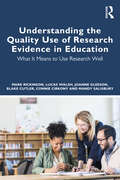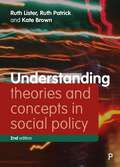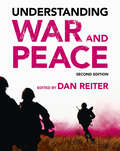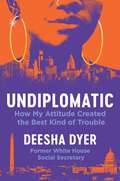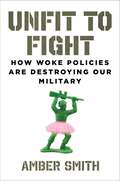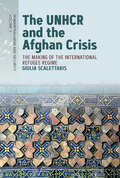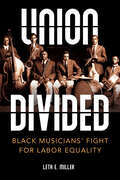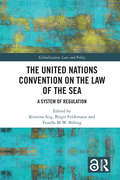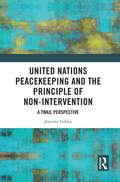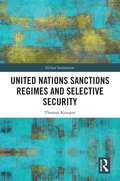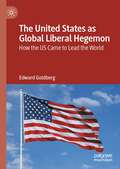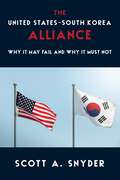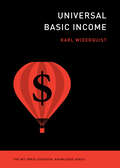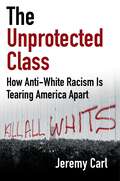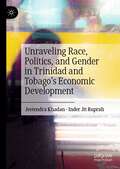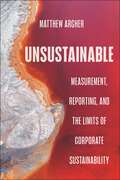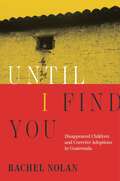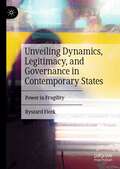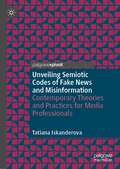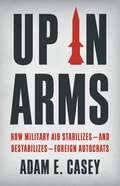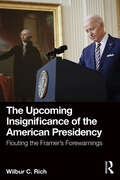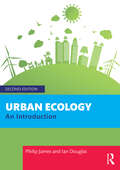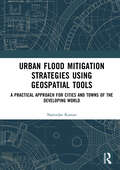- Table View
- List View
Understanding the Quality Use of Research Evidence in Education: What It Means to Use Research Well
by Mark Rickinson Lucas Walsh Joanne Gleeson Blake Cutler Connie Cirkony Mandy SalisburyThis book focuses on the question of how to understand quality use of research evidence in education, or what it means to use research evidence well. Internationally there are widespread efforts to increase the use of research evidence within educational policy and practice. Such efforts raise important questions about how we understand not just the quality of evidence, but also the quality of its use. To date, there has been wide-ranging debate about the former, but very little dialogue about the latter. Based on a five-year study with schools and school systems in Australia, this book sheds new light on: why clarity about quality of use is critical to educational improvement; how quality use of research evidence can be framed in education; what using research well involves and looks like in practice; what quality research use means for individuals, organisations and systems; and what aspects of using research well still need to be better understood. This book will be an invaluable resource for professionals within and beyond education who want to better understand what using research evidence well means and involves and how it can be supported.
Understanding Theories and Concepts in Social Policy (Understanding Welfare: Social Issues, Policy and Practice)
by Ruth Lister Ruth Patrick Kate BrownDemonstrating the relevance of theory to political and policy debates and practice, this lively and accessible second edition helps students to grasp the real-life implications of social policy theory. The updated text includes consideration of contemporary shifts in welfare ideologies in the context of global austerity and the UK Coalition and Conservative governments since 2010. With a new chapter focusing on critical debates about disability, sexuality and the environment, this textbook also includes fresh reflections on migration, conditionality, resilience, social justice and human rights. Key features include: • real-life examples from UK and international politics and policy to explain and illuminate the significance of social policy theory; • key questions for student reflection and engagement; and • bulleted chapter summaries and annotated further readings at the end of every chapter. This new edition is a dynamic, engaging and valuable introduction to the key theoretical perspectives and concepts deployed in social policy.
Understanding War and Peace
by Dan ReiterWritten for undergraduate students studying the politics of conflict and cooperation, Understanding War and Peace considers the roots of global conflicts and the various means used to resolve them. Edited by Dan Reiter with contributing authors who are all leading scholars in the field, it balances approachable, engaging writing with a conceptually rigorous overview of the most important ideas in conflict studies. Focusing on concepts, policy, and historical applications, the text minimizes literature reviews and technical jargon to engagingly present all major topics in international conflict, including nuclear weapons, peacekeeping, terrorism, gender, alliances, nuclear weapons, environment and conflict, civil wars, public opinion. Enriching the textbook pedagogy, each chapter concludes with a summary of a published quantitative study to introduce students with no prior quantitative training to quantitative analysis. Online resources for instructors include an instructor manual, a test bank and contemporary case studies for each chapter topic regarding the conflict in Ukraine.
Undiplomatic: How My Attitude Created the Best Kind of Trouble
by Deesha DyerWithout credentials or connections, community college student and advocate Deesha Dyer navigated her imposter syndrome, landing one of the most exclusive positions in the White House. From the most unlikely person to end up as a senior official to President Barack Obama and First Lady Michelle Obama comes a candid, incredible, and inspiring story. Moved by the election of the country&’s first Black president, Deesha Dyer applied for a White House internship in 2009 as a thirty-one-year-old part-time community college student, taking a leap that carried her into a permanent full-time position, followed by three promotions landing her at the epicenter of politics. In spite of the little voice in her head telling her she didn&’t deserve to be there, Deesha thrived and rose to the highly coveted role of White House social secretary, giving her a front-row seat to defining moments in history while curating some of the flyest parties 1600 Pennsylvania has ever seen. Yet, with humor and realness, she peels back the curtain, revealing the hard truth about why she spent years trying to hide behind it. Undiplomatic is a deeply personal narrative about combating self-doubt while being on top of the world. Deesha reflects on how imposter syndrome threatened her self-esteem, proven aptitude, and survival until she realized that it was neither her fault nor her responsibility. In this vivid portrayal from a true &“around the way girl&” on the personal impact of the Obama presidency, Deesha shares her road map from imposter to impact. In Undiplomatic, she invites you on a journey of self-discovery where she overcame doubt, unearthed true love for herself, and learned that your unique worth is not something to be earned, but something inherently deserved. Uplifting, funny, and sincere, Deesha&’s story shows you about authenticity at all costs, and the joy and freedom that awaits on the other side.
Unfit to Fight: How Woke Policies Are Destroying Our Military
by Amber SmithOur Woke Military Could Lose the Next WarWokeness used to be an annoying distraction in the U.S. military. Now it is a major threat to national security.Faster than most of us thought possible, our military has become a woke, dysfunctional bureaucracy focused not on winning wars but on identity politics, gender ideology, climate change, and other favored causes of the leftist elite.Don&’t think that China isn&’t watching. Don&’t think that Russia, Iran, and North Korea haven&’t noticed.But so has Amber Smith, a former U.S. Army combat helicopter pilot and Deputy Assistant to the Secretary of Defense. In her riveting new book, Unfit to Fight, she sounds the alarm that our military and our nation are at grave risk.In Unfit to Fight, you&’ll learn:Why the military should not &“reflect American society,&” but be a select group of lethal professionalsHow the Pentagon rewards lowered standards for the sake of &“diversity&”Why failure often leads to promotion—if you have the right friendsWhy a return to combat merit, battlefield mission, and trust in leadership are essential—or we will lose our next warElections, as they say, have consequences, and catastrophic damage to national security is among the most important. Amber Smith&’s Unfit to Fight needs to be in the hands of everyone who cares about our military and our survival as a nation.
The UNHCR and the Afghan Crisis: The Making of the International Refugee Regime (Humanitarianism and Security #3)
by Giulia ScalettarisToday the UNHCR is present in more than 130 countries and takes care of some 90 million people. This book looks at how it is deployed and who its agents are. By taking the reader through the offices in charge of the Afghan refugee crisis during the 2000s, in Geneva and in Kabul, the book shows the internal functioning of this international organization. It provides analysis of Afghan refugee policies from an original position, with the author being both agency official and anthropologist, and articulates multiple levels of analysis: the micropolitics of practices as much as the institution and the multi-scalar power relations that shape its environment.
Union Divided: Black Musicians' Fight for Labor Equality (Music in American Life)
by Leta E. MillerAn in-depth account of the Black locals within the American Federation of Musicians In the 1910s and 1920s, Black musicians organized more than fifty independent locals within the American Federation of Musicians (AFM) in an attempt to control audition criteria, set competitive wages, and secure a voice in national decision-making. Leta Miller follows the AFM’s history of Black locals, which competed directly with white locals in the same territories, from their origins and successes in the 1920s through Depression-era crises to the fraught process of dismantling segregated AFM organizations in the 1960s and 70s. Like any union, Black AFM locals sought to ensure employment and competitive wages for members with always-evolving solutions to problems. Miller’s account of these efforts includes the voices of the musicians themselves and interviews with former union members who took part in the difficult integration of Black and white locals. She also analyzes the fundamental question of how musicians benefitted from membership in a labor organization. Broad in scope and rich in detail, Union Divided illuminates the complex working world of unionized Black musicians and the AFM’s journey to racial inclusion.
The United Nations Convention on the Law of the Sea: A System of Regulation (Globalization: Law and Policy)
by Kristina Siig Birgit Feldtmann Fenella M.W. BillingThe 1982 United Nations Convention on the Law of the Sea (UNCLOS) has for four decades been considered by many to be one of the most important legislative achievements of international law. It is revered as a "constitution of the oceans", providing the legal framework for the governance of the oceans. This volume explores how the UNCLOS is functioning in various complex settings, how it adapts to new, emerging developments, as well as how it interacts with other regulation, both within the law of the sea regime and outside. Engaging in themes such as law and order at sea, UNCLOS’ interaction with human rights and the role of private actors, the book raises complex questions in the application, understanding, and enforcement of the convention and how it can be envisaged, interpreted, and used in a dynamic world. The volume also raises methodological questions, the answers to which may enhance the predictability and coherence of the law under UNCLOS and thus secure its role as the predominant and relevant system for legal governance at sea for many decades to come. As a contribution to ensuring the future relevance of UNCLOS, the book will be a valuable resource for scholars, diplomats, judges and other practitioners who are working with and interpreting the law of the sea and related issues of maritime law, migration law, human rights law and humanitarian law.
The United Nations Convention on the Law of the Sea: A System of Regulation (Globalization: Law and Policy)
by Kristina Siig Birgit Feldtmann Fenella M.W. BillingThe 1982 United Nations Convention on the Law of the Sea (UNCLOS) has for four decades been considered by many to be one of the most important legislative achievements of international law. It is revered as a "constitution of the oceans", providing the legal framework for the governance of the oceans. This volume explores how the UNCLOS is functioning in various complex settings, how it adapts to new, emerging developments, as well as how it interacts with other regulation, both within the law of the sea regime and outside. Engaging in themes such as law and order at sea, UNCLOS’ interaction with human rights and the role of private actors, the book raises complex questions in the application, understanding, and enforcement of the convention and how it can be envisaged, interpreted, and used in a dynamic world. The volume also raises methodological questions, the answers to which may enhance the predictability and coherence of the law under UNCLOS and thus secure its role as the predominant and relevant system for legal governance at sea for many decades to come.As a contribution to ensuring the future relevance of UNCLOS, the book will be a valuable resource for scholars, diplomats, judges and other practitioners who are working with and interpreting the law of the sea and related issues of maritime law, migration law, human rights law and humanitarian law.
United Nations Peacekeeping and the Principle of Non-Intervention: A TWAIL Perspective
by Jennifer GiblinUsing a unique application of Third World Approaches to International Law (TWAIL), this book provides a critical, interdisciplinary, examination of the contemporary practice of UN peacekeeping.Is peacekeeping intervention? Since its conception in the mid-1950s, peacekeeping has significantly evolved from traditional, lightly armed, passive operations to robust, multi-dimensional stabilisation peacekeeping operations. This raises questions as to whether this is simply a natural evolution of peacekeeping or whether it marks an expansion of the concept beyond its boundaries, pushing it into the realm of peace enforcement or intervention. In response, this book examines the frameworks which govern UN peacekeeping and seeks to understand the relationship between peacekeeping and the principle of non-intervention. Providing practical examples from the United Nations’ operations in the Democratic Republic of the Congo and drawing upon interviews with key international actors including UN personnel, the book explores the boundaries of peacekeeping, contending that peacekeeping, at times, becomes a form of intervention. This, the book argues, is detrimental both to the concept of peacekeeping and to the host state, and it concludes by offering a series of recommendations to re-affirm peacekeeping’s boundaries and amplify the effectiveness of contemporary peacekeeping. This book will be of interest to scholars and students in international law, international relations, politics, history and criminology.
United Nations Sanctions Regimes and Selective Security (ISSN)
by Thomas KruiperThis book investigates the selective nature of UN sanctions regimes with a specific focus on the post-Cold War era. Legally binding on all members, UN sanctions are the most effective and legitimate non-violent multilateral tools to respond to international security threats. They are also symbolically more powerful than unilateral or multilateral sanctions because they enjoy global support. However, while dozens of threats to international peace were met with UN sanctions since 1990, many others were not. How can we explain this incoherent approach? With a focus on the selectiveness, rather than effectiveness of UN sanctions the author reflects on the shifting geopolitical tensions between Security Council members and uses a variety of widely used academic datasets to provide a unique overview of what determines sanctions and sanctionable events. The primary audience will be scholars and students of international relations, international organizations, security studies, and political economy.
The United States as Global Liberal Hegemon: How the US Came to Lead the World
by Edward GoldbergThe United States as Global Liberal Hegemon examines America’s role as the global liberal hegemon. Using a historical analysis to understand how the United States came to serve as the world leader, Goldberg argues why the role of a liberal hegemon is needed, whether the United States has the ability to fulfill this role, and what the pitfalls and liabilities of continuing in this role are for the nation. He also considers the impact that this role on the global stage has for the country as well as individual citizens of the United States. Goldberg argues that the United States's geographic location away from strong competitors, it's role as the dominant economy for much of the 20th century, and its political culture of meritocracy all contributed to the United States taking this role in the 1940s. He also argues that the role of liberal hegemon has shifted to include not only being the international policeperson but also to be the world's central banker, a role that at this time only the Unites States can fill.
The United States–South Korea Alliance: Why It May Fail and Why It Must Not (A Council on Foreign Relations Book)
by Scott A. SnyderThe alliance between the United States and South Korea has endured through seven decades of shifting regional and geopolitical security contexts. Yet it now faces challenges from within. Domestic political turmoil, including deepening political polarization and rising nationalism in both countries, has cast doubt on the alliance’s viability—with critical implications for the balance of power in East Asia.Scott A. Snyder provides an authoritative overview of the internal and external pressures on the U.S.–South Korea alliance and explores its future prospects. He argues that nationalist leaders’ accession to power could put past successes at risk and endanger the national security objectives of both countries. In the United States, “America first” nationalism favors self-interest over cooperation and portrays allies as burdens or even free riders. “Korea first” sentiments, in both progressive and conservative forms, present the U.S. military presence in South Korea as an obstacle to Korean reconciliation or a shackle on South Korea’s freedom of action. Snyder also examines North Korea’s attempts to influence South Korean domestic politics and how China’s growing strength has affected the dynamics of the alliance. He considers scenarios in which the U.S.–South Korea relationship weakens or crumbles, emphasizing the consequences for the region and the world. Drawing on this analysis, Snyder offers timely recommendations for stakeholders in both countries on how to preserve and strengthen the alliance.
Universal Basic Income (The MIT Press Essential Knowledge series)
by Karl WiderquistAn accessible introduction to the simple (yet radical) premise that a small cash income, sufficient for basic needs, ought to be provided regularly and unconditionally to every citizen.The growing movement for universal basic income (UBI) has been gaining attention from politics and the media with the audacious idea of a regular, unconditional cash grant for everyone as a right of citizenship. This volume in the Essential Knowledge series presents the first short, solid UBI introduction that is neither academic nor polemic. It takes a position in favor of UBI, but its primary goal remains the provision of essential knowledge by answering the fundamental questions about it: What is UBI? How does it work? What are the arguments for and against it? What is the evidence?Karl Widerquist discusses how UBI functions, showing how it differs from other redistributional approaches. He summarizes the common arguments for and against UBI and presents the reasons for believing it is a tremendously important reform. The book briefly discusses the likely cost of UBI; options for paying for it; the existing evidence on the probable effects of UBI; and the history of UBI from its inception more than two hundred years ago through the two waves of support it received in the twentieth century to the third and largest wave of support it is experiencing now. Now more than ever, conditions in much of the world are ripe for such enthusiasm to keep growing, and there are good reasons to believe that this current wave of support will eventually lead to the adoption of UBI in several countries around the world—making this volume an especially timely and necessary read.
The Unprotected Class: How Anti-White Racism Is Tearing America Apart
by Jeremy CarlAnti-white racism, undisguised and unembarrassed, is now official policy in America.One class of citizens—whites—is openly discriminated against in every sphere of public and private life. The Unprotected Class is a comprehensive explanation of how we got here and what we must do to correct a manifest—and dangerous—injustice. Launched with an appeal to justice for all, the civil rights movement went off the rails even as it achieved its original goals. Soon its excesses and failures were exploited to justify discrimination against whites in business, education, law, entertainment, and even the church. With the death of George Floyd and the shedding of all pretense of racial justice, vindictiveness, resentment, and hatred were unleashed in America.
Unraveling Race, Politics, and Gender in Trinidad and Tobago’s Economic Development
by Jeetendra Khadan Inder Jit RuprahThis book delves into Trinidad and Tobago's development with a fresh lens. It stands as the inaugural empirical exploration of the country's unique attributes, including its diversity, ex-British colony status, small-state categorization by population size, and its dependence on hydrocarbons.Through meticulous empirical analysis, this book scrutinizes the nation's economic, social, and political outcomes within the context of these four distinctive parameters, offering fresh insights into the country's development trajectory.What sets this book apart is its unwavering commitment to a data-driven approach. Drawing upon a vast array of databases from both international and national sources, it provides a thorough examination of development indicators, household welfare metrics, firm-level performance, and individual perspectives on a wide range of political, economic, and social issues.For scholars, policymakers, and anyone with an interest in understanding how unique contextual factors shape a Trinidad and Tobago's development, this book offers an enlightening and data-rich perspective on the nation's journey towards progress and prosperity.
Unsettling Choice: Race, Rights, and the Partitioning of Public Education
by Ujju AggarwalHow the Great Recession revealed a system of school choice built on crisis, precarity, and exclusion What do universal rights to public goods like education mean when codified as individual, private choices? Is the &“problem&” of school choice actually not about better choices for all but, rather, about the competition and exclusion that choice engenders—guaranteeing a system of winners and losers? Unsettling Choice addresses such questions through a compelling ethnography that illuminates how one path of neoliberal restructuring in the United States emerged in tandem with, and in response to, the Civil Rights movement. Drawing on ethnographic research in one New York City school district, Unsettling Choice traces the contestations that surfaced when, in the wake of the 2007–2009 Great Recession, public schools navigated austerity by expanding choice-based programs. Ujju Aggarwal argues that this strategy, positioned as &“saving public schools,&” mobilized mechanisms rooted in market logics to recruit families with economic capital on their side, thereby solidifying a public sphere that increasingly resembled the private—where contingency was anticipated and rights for some were marked by intensified precarity for poor and working-class Black and Latinx families. As Unsettling Choice shows, these struggles over public schools—one of the last remaining universal public goods in the United States—were entrapped within neoliberal regimes that exceeded privatization and ensured exclusion even as they were couched in language of equity, diversity, care, and rights. And yet this richly detailed and engaging book also tracks an architecture of expansive rights, care, and belonging built among poor and working-class parents at a Head Start center, whose critique of choice helps us understand how we might struggle for—and reimagine—justice, and a public that remains to be won. Retail e-book files for this title are screen-reader friendly with images accompanied by short alt text and/or extended descriptions.
Unsustainable: Measurement, Reporting, and the Limits of Corporate Sustainability
by Matthew ArcherA behind-the-scenes look at how corporate and financial actors enforce a business-friendly approach to global sustainabilityIn recent years, companies have felt the pressure to be transparent about their environmental impact. Large documents containing summaries of yearly emissions rates, carbon output, and utilized resources are shared on companies’ social media pages, websites, and employee briefings in a bid for public confidence in corporate responsibility.And yet, Matthew Archer argues, these metrics are often just hollow symbols. Unsustainable contends with the world of big banks and multinational corporations, where sustainability begins and ends with measuring and reporting. Drawing on five years of research among sustainability professionals in the US and Europe, Unsustainable shows how this depoliticizing tendency to frame sustainability as a technical issue enhances and obscures corporate power while doing little, if anything, to address the root causes of the climate crisis and issues of social inequality. Through this obsession with metrics and indicators, the adage that you can’t manage what you can’t measure transforms into a belief that once you’ve measured social and environmental impacts, the market will simply manage them for you.The book draws on diverse sources of evidence—ethnographic fieldwork among a wide array of sustainability professionals, interviews with private bankers, and apocalyptic science fiction—and features analyses of name-brand companies including Volkswagen, Unilever, and Nestlé. Making the case for the limits of measuring and reporting, Archer seeks to mobilize alternative approaches. Through an intersectional lens incorporating Black and Indigenous theories of knowledge, power and value, he offers a vision of sustainability that aims to be more effective and more socially and ecologically just.
Until I Find You: Disappeared Children and Coercive Adoptions in Guatemala
by Rachel NolanThe poignant saga of Guatemala’s adoption industry: an international marketplace for children, built on a foundation of inequality, war, and Indigenous dispossession.In 2009 Dolores Preat went to a small Maya town in Guatemala to find her birth mother. At the address retrieved from her adoption file, she was told that her supposed mother, one Rosario Colop Chim, never gave up a child for adoption—but in 1984 a girl across the street was abducted. At that house, Preat met a woman who strongly resembled her. Colop Chim, it turned out, was not Preat’s mother at all, but a jaladora—a baby broker.Some 40,000 children, many Indigenous, were kidnapped or otherwise coercively parted from families scarred by Guatemala’s civil war or made desperate by unrelenting poverty. Amid the US-backed army’s genocide against Indigenous Maya, children were wrested from their villages and put up for adoption illegally, mostly in the United States. During the war’s second decade, adoption was privatized, overseen by lawyers who made good money matching children to overseas families. Private adoptions skyrocketed to the point where tiny Guatemala overtook giants like China and Russia as a “sender” state. Drawing on government archives, oral histories, and a rare cache of adoption files opened briefly for war crimes investigations, Rachel Nolan explores the human toll of an international industry that thrives on exploitation.Would-be parents in rich countries have fostered a commercial market for children from poor countries, with Guatemala becoming the most extreme case. Until I Find You reckons with the hard truths of a practice that builds loving families in the Global North out of economic exploitation, endemic violence, and dislocation in the Global South.
Unveiling Dynamics, Legitimacy, and Governance in Contemporary States: Power in Fragility
by Ryszard FicekThis book delves into the complex dynamics of legitimizing power in fragile states. With five comprehensive chapters, it analyzes the geopolitical, domestic, and international dimensions of fragile states. The unique contribution lies in unraveling specific forms of legitimization linked to various types of state fragility, providing a nuanced understanding. The book distinguishes between temporary crises and chronic fragility, crucial for shaping effective international support strategies. It addresses the challenges and consequences of weak legitimacy on global security, highlighting its impact on aid interventions and systemic stability. The author's analysis emphasizes the diverse nature of political regimes in fragile states, incorporating considerations of hybrid regimes. Additionally, it explores the dynamics of authoritarian enclaves at the sub-state level, revealing their potential national influence. By scrutinizing the decline of trust in democratic systems, the book addresses contemporary challenges, making it a vital resource for understanding and navigating the complexities of fragile states' political landscapes.
Unveiling Semiotic Codes of Fake News and Misinformation: Contemporary Theories and Practices for Media Professionals
by Tatiana IskanderovaThis book offers a comprehensive exploration of the widespread issue of fake news and misinformation. Using real-life examples and semiotic theory, the author demonstrates how language, images, and symbols are being utilized in media production and distribution with the intention of altering the perception of individuals and shaping their beliefs. The book also addresses how social and cultural factors influence the spread of information and emphasizes the importance of understanding the context in which information is being received and shared. This book is a must-read for anyone seeking to understand the impact of fake news and misinformation on society, especially academics, researchers, journalists, policymakers, and media professionals at all levels. The author provides contemporary theories and practical strategies to navigate the complex and ever-changing media landscape.
Up in Arms: How Military Aid Stabilizes—and Destabilizes—Foreign Autocrats
by Adam E CaseyAn &“extraordinary…must-read&” (Steven Levitsky, New York Times–bestselling coauthor of How Democracies Die) look at how support from foreign superpowers propped up—and pulled down—authoritarian regimes during the Cold War, offering lessons for today&’s great power competition Throughout the Cold War, the United States and Soviet Union competed to prop up friendly dictatorships abroad. Today, it is commonly assumed that this military aid enabled the survival of allied autocrats, from Taiwan&’s Chiang Kai-shek to Ethiopia&’s Mengistu Haile Mariam. In Up in Arms, political scientist Adam E. Casey rebuts the received wisdom: aid to autocracies often backfired during the Cold War. Casey draws on extensive original research to show that, despite billions poured into friendly regimes, US-backed dictators lasted in power no longer than those without outside help. In fact, American aid often unintentionally destabilized autocratic regimes. The United States encouraged foreign regimes to establish strong, independent armies like its own, but those armies often went on to lead coups themselves. By contrast, the Soviets promoted the subordination of the army to the ruling regime, neutralizing the threat of military takeover. Ultimately, Casey concludes, it is subservient militaries—not outside aid—that help autocrats maintain power. In an era of renewed great power competition, Up in Arms offers invaluable insights into the unforeseen consequences of overseas meddling, revealing how military aid can help pull down dictators as often as it props them up.
The Upcoming Insignificance of the American Presidency: Flouting the Framer's Forewarnings
by Wilbur C. RichThis new text analyzes the development of the presidency as the dominant political institution in the United States and raises questions about its future relevance. In this history of the U.S. executive branch from the framing of the Constitution to the Biden administration, author Wilbur C. Rich illuminates the transformation of the presidential role by a variety of extra-constitutional, non-legal forces, technology, and social changes.The book highlights how some presidents nevertheless have managed to maintain relevancy and dominance by adapting to these changes or by introducing changes of their own. For undergraduate students and researchers of presidential history and American political development, this expansive historical overview of the executive branch in America makes a strong case that the significance of the American presidency has declined dramatically—and perhaps irrevocably—in the modern presidency.
Urban Ecology: An Introduction
by Philip James Ian DouglasThis fully revised second edition reflects the great expansion in urban ecology research, action, and teaching since 2015. Urban ecology provides an understanding of urban ecosystems and uses nature-based techniques to enhance habitats and alleviate poor environmental conditions. Already the home to the majority of the world’s people, urban areas continue to grow, causing ecological changes throughout the world. To help students of all professions caring for urban areas and the people, animals, and plants that live in them, the authors set out the environmental and ecological science of cities, linkages between urban nature and human health, urban food production in cities, and how we can value urban nature. The authors explore our responsibilities for urban nature and greening, ecological management techniques, and the use of nature-based solutions to achieve a better, more sustainable urban future and ensure that cities can climate change and become more beautiful and more sustainable places in which to live. This text provides the student and the practitioner with a critical scientific overview of urban ecology that will be a key source of data and ideas for studies and for sound urban management.
Urban Flood Mitigation Strategies Using Geo Spatial Tools: A Practical Approach for Cities and Towns of Developing World
by Narendar KumarThe disastrous effects of floods in urban areas of various Indian cities have been increasing in severity and extent over the past decade. This book explores flood disasters, their impact in world and Indian contexts, assessing vulnerability and risks involved, and systematic use of (GIS)-enabled platforms to map mitigation measures sustainably, with special reference to the metropolitan flood mitigation endeavors. This book balances the theoretical with empirical approaches to form a unique standpoint on the various challenges and possible solutions to urban flooding in India. Through a study of major urban flood incidents, this book analyzes the factors which contribute to the rising risk of flooding with increasing urbanization, population dynamics, growth, and urban sprawl, with particular focus on the cities of Chennai, Mumbai, and Hyderabad in India. It also examines disaster governance on urban floods and legislative prospects of flood disasters through discussions on standing acts, United Nations (UN) directives, and internationally adopted practices and actions, which are applicable in the Indian context. An interdisciplinary study, this book brings together tools and research from various disciplines including geography, urban and regional planning, and GIS. It will be an invaluable resource for researchers, scholars, engineers, students, planners, academicians, and professionals of cross-disciplines to help them resolve the problem of urban flooding. It will also be of interest to the general reader seeking to learn more about disasters, urban flooding, engineering, and GIS.
